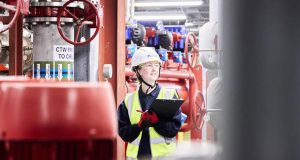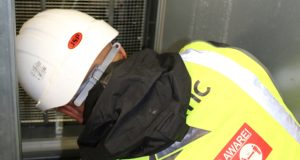Rapidly declining rates in health and safety standards on UK construction sites is sparking industry-wide concern and a growing need for firms across the country to install temporary CCTV towers, say Kingdom Systems.
Kingdom, who secure hundreds of construction sites each year, warn about the declining levels of health and safety compliance from sub-contractors, especially on some more temporary sites, which is putting workers at risk of serious injury and costing companies millions in claims.
Temporary CCTV towers help prevent workplace injury with adaptive AI technology, ensuring tradespeople wear appropriate PPE on construction sites. As shocking Health and Safety Executive (HSE) stats show, workplace injury costs the industry upwards of £16.2 billion every year with2022/2023 reporting a higher rate of construction-related fatalities than years prior.
As well as this, health and safety inspections on sites have decreased in the past decade – with decreases of 32 per cent in HSE inspections since 2013/2014. This combination of costly claims and unsafe practices going under the radar have left UK firms clambering for innovative solutions, says Kingdom Systems, who adds that the issue lies “largely in the hands of individual firms to tackle, and for site managers to put preventative measures in place”.
Regularly, project managers and UK firms find themselves unable to continuously monitor all tradespeople for safety compliance. This makes construction sites a hot spot for work-related injury. In particular, site managers of temporary sites have a difficult choice between choosing to install expensive permanent CCTV only to dismantle it, or risk their worker’s safety and profits due to non-compliance.
Temporary CCTV towers can identify these ongoing risk points and reduce the constant burden on project managers on construction sites, for employees and non-employees alike, ensuring even construction sites that are temporary are regulated effectively for health and safety breaches.
Temporary systems can also help mitigate health and safety risks to the public, deterring kids and urban explorers who may not fully appreciate the danger that comes with entering a site. Construction sites bear significant legal and ethical responsibilities to protect the public from harm, regardless of whether individuals are trespassing or not.
Paul Worsley, Director of Service, Kingdom Systems commented: “Work-related injuries are a huge concern for all construction site managers and staff, especially when the demand for fast and efficient infrastructure development is so high post-COVID so projects can’t be delayed. With the installation of permanent fixed CCTV towers being expensive and unfeasible for temporary sites, managers might be tempted to skip CCTV, which we wouldn’t advise.
“Installing temporary CCTV is the best solution, with adaptive AI that recognises faltering compliance, they can be positioned all around the construction site and remain an innovative solution for project managers and give people onsite a warning if they aren’t following correct procedure.”
CCTV footage from temporary stations can also provide a documented record of work-place related accidents in the event of subsequent filing of insurance claims.
Worsley added: “For everyone within the industry, temporary CCTV towers can aid enhanced compliance on UK sites, reducing the worry and stress of individual firms and tradespeople. With the sector in more demand than ever, we need more innovative solutions to health and safety in the workplace.”
Frontline workers form the backbone of facilities management services, serving as the face of the brand and interacting directly with customers. Yet research by both L&G and the Living Wage Foundation reveals the majority feel overlooked and expendable.
Accelerating the problem is a growing technology gap. Despite having 2.7 billion deskless workers worldwide, representing 80 per cent of the global workforce, only one per cent of software and technology investments has been allocated to this segment. This means there is a huge disconnect between frontline workers and their headquarters, leading to lack of sufficient training, communication challenges and low employee retention.
For this webinar, FMJ has teamed up with frontline training platform Lingio to bring together a panel of experts, to discuss how easy-to-use and efficient AI tools can help create engaging and gamified learning experiences that fit the needs of underserved deskless workers. The result? Better software and learning experiences lead to improved staff engagement and reduced staff turnover by up to 95 per cent, according to McKinsey.
To register for the webinar taking place on 11 September at 11:00 am click here.




